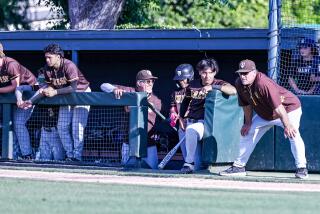Pride in competition for skid row basketball teams
- Share via
Chris Allen took a look and let it go. Swish. With that, Allen’s Midnight Mission team won its first round against the Mamba Strikes at the Nike Basketball 3-on-3 Tournament on Saturday in downtown Los Angeles.
For many of the men on the skid row service center’s two teams, the day wasn’t just about basketball. It was about pride and accomplishment, hope and optimism, about reconnecting to a larger world than the isolation of drug addiction and homelessness they have battled.
“It brought back memories of high school, the feeling of being a winner, the experience of being part of something positive,” said Allen, 28, who was a starting guard for Crenshaw High School in the late 1990s.
Until recently, Allen hadn’t felt much like a winner. Like most of his Midnight Mission teammates, he had succumbed to substance abuse, dropped out of school, struggled to hold a job and ended up on the streets.
He found help at the mission, which offers food, clothing, educational and job training, housing assistance, recovery programs, and — this weekend — a chance to shine among more than 1,000 basketball teams at the Nike tournament.
The idea to enter the tournament came from Orlando Ward, the mission’s director of program services. The 6-foot-7 director was a standout player in high school, earning plaudits as Orange County’s basketball player of the year in 1978. He was a starting forward for Stanford University until a knee injury his sophomore year ended his athletic career. He became depressed and addicted to cocaine, he said.
Although he landed a job as a senior marketing representative for Xerox after graduating from Stanford, his addiction deepened. Bad went to worse, and he ended up on skid row and in jail for drug possession and other crimes.
After more than two years on the streets, Ward found his way to the mission and entered its 12-step residential drug-treatment program in 1999. As he worked in the dining room serving meals to residents — most participants are assigned jobs to help build self-esteem — Ward had an epiphany. “My life should be built on service and humility,” he said.
Ward worked his way up to paying jobs at the mission and was named its associate director for program development in 2000, the highest-ranking manager to come from the streets.
That street knowledge helped him see the value in fielding teams for the Nike tournament, whose organizer, AEG, waived the entry fee for both teams.
“The most valuable lesson for them is ‘Yes, I can be part of society,’ ” Ward said. “I can work through my challenges and disappointments and still end up victorious.”
At 8:15 a.m. Saturday, the team lined up outside the mission at San Pedro and 6th streets. They were bedecked in blue-and-white uniforms emblazoned with the name “Midnight.” Some warmed up with between-the-legs dribbling. Two team members stepped up to lead the procession, holding the mission’s banner aloft.
Drawing smiles and stares, they dribbled past the flower shops on San Pedro and fabric stores on Maple, then headed west on 8th Street. At L.A. Live, loudspeakers blasted hip-hop music and game announcements. Booths offered free snacks, drinks and games while a fitness trainer demonstrated exercises in the main center court.
Anthony Colvin stared in wonder. The Alabama native has lived at the mission for seven months but never ventured a mile west to L.A. Live.
“I’m excited,” he said. “It gives you a sense of being part of something.”
Colvin’s team, Midnight Mission No. 2, would lose a tough first game against the Great White Buffalos, whose beefy players had been on a team together at Redlands High School and went on to play college ball. They lost their second game to the Los Angeles Police Department team and will play in the consolation bracket Sunday.
After polishing off the Mamba Strikes, Allen’s team won its second game against Ridge Again and lost its third game to the Avenue team.
But win or lose, Mission team member Rodney Black said that just playing the game was a victory. The 46-year-old New Jersey native has been off of crack cocaine for 11 months and is enrolled in an 18-month certification program to become a substance-abuse counselor.
“When you come to the mission, you have low self-esteem, feelings of guilt and shame,” Black said. “But playing out here makes you proud.”
teresa.watanabe@latimes.com
More to Read
Get our high school sports newsletter
Prep Rally is devoted to the SoCal high school sports experience, bringing you scores, stories and a behind-the-scenes look at what makes prep sports so popular.
You may occasionally receive promotional content from the Los Angeles Times.







